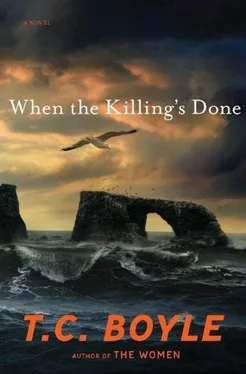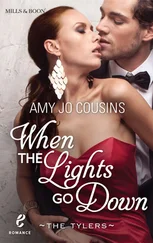But it was. And he had a smile that was like an erasure, no worries, no fears. “Rita?” He pushed aside the paper and lifted his eyes to her (blue shading to gray with flecks of gold fracturing the field) over the lenses of his reading glasses. “Is that you?”
She’d dressed in jeans, flip-flops, a turquoise blouse with short sleeves and a scooped neckline, and she’d done her face and eyes, not knowing what to expect. She wore her hair up, thinking that was how a cook would wear it, and she made a point of getting there at the stroke of noon, rehashing in her mind the few recipes she knew, a handful of curry dishes their drummer had taught her, chicken cordon bleu, scallops in a wine reduction, but she really didn’t think anything would come of it. If he asked her about experience she’d have to be honest with him and say that she’d never done anything professionally, just whipping up things for her daughter and her ex-husband and once in a while a dinner party, but if truth be told they wound up eating out about half the time, fast food, pizza, chicken wings — she was a fool for chicken wings. “Yeah,” she said, giving back his smile, “it’s me.”
“Well, sit down,” he said, folding up the newspaper and handing her the menu. He took a moment, realigning the silverware on the paper placemat that featured the name of the restaurant and a picture of the owner — a fat man, bald — printed on the front and puzzles for kids on the back. “Two things,” he said finally, his voice a rumble, his cracked blue eyes fixed on her as if he was afraid she was going to get up and flit away like a bird. “Call me Bax. And lunch is on me.” Another pause. “And I have to say I didn’t expect anybody so, so — what am I trying to say here?”
That was when she began to feel uneasy all over again: was he hitting on her, was that it? Was this just going be some sleazy proposition? An island? With cowboys? What had she been thinking? “I don’t know,” she heard herself say. And now she was the one toying with the silverware, fork, knife, spoon, shifting the mug and paper napkin like chess pieces. She looked up at him, trying to inject a little brightness into her voice: “What’s good here?”
He seemed to have lost his train of thought, but he was still staring at her, reading her, giving her a look that was hard to mistake. It took him a moment. Finally he said, “I like the Reuben. But you aren’t one of these types that don’t eat this, that or the other, are you? I mean, meat or whatever?”
She shook her head.
“And you can cook?”
She began ticking off recipes — anything she could think of, from macaroni and cheese to lobster thermidor — before he cut her off.
“You don’t understand. It’s lamb we’re talking about. In a stew, fricasseed, roasted, barbecued — with a pot of beans, raw onions, a stack of tortillas. Flapjacks in the morning, eggs, more lamb. There’s seven of us. At shearing you can double that.”
“Cafeteria style,” she said, and he laughed.
Then the waitress was there and they both ordered Reubens and he asked for iced tea and she a diet Coke. They watched the waitress recede, looked up in unison as an elderly couple shuffled in the door as if concrete blocks were attached to their feet and settled into the booth across from them, heaving for breath. There was a counter running the length of the place, half a dozen disconsolate men there, propped up on their elbows and staring into the distance, truckers maybe, rejects from the naval base, the perennially laid off, people with time on their hands. A chalkboard over the soft-serve machine advertised the spaghetti special, with tossed salad and garlic bread. She felt the tug of hopelessness.
“Three meals a day,” he said, his tone business-like now, admonitory even. “Up before dawn, to bed at dark. What I’m hoping is to pick up a generator.” He paused, dropped his eyes. “If not this trip, then the next one.”
She let nothing show on her face. What she wanted was an adventure, what she wanted was out, but she could detect the makings of a long grinding disaster spinning out before her. What did she know about sheep, cowboys, ranches, islands, cooking even? “What about water? You have running water, don’t you?”
He ducked his head, then lifted his chin and ran the fingers of both hands through his hair, which fell forward, thick and thickly greased. “We’re working on it. It’s all part of the plan. And if things might be a bit rough now, I tell you, it’s worth it. I mean, if you like the outdoors — you do, don’t you?” His eyes jumped at hers but he didn’t wait for an answer. “And a cook — a cook is going to really help because it frees up a man so we can put all our energy into getting the place up and running. And improved. Livable, you know? Or more than livable: cozy. Cozy’s what we’re shooting for.”
“O-kay,” she said, very slowly, drawing out the vowels. “But we haven’t talked salary.”
He waved a hand as if to say nothing could be simpler or more amenable. She watched him lift the glass of iced tea and take a long leisurely drink. He was laughing suddenly, his eyes retreating into the hallway of some private joke. “Hell, we got Francisco cooking for us now — he’s a sheepman and he smells like it too, no matter how many bars of soap I bring back for him, not to mention Old Spice. I gave him the biggest bottle I could find, but you couldn’t tell the difference — I wouldn’t put it past him if he drank it. The man burns everything — coffee, beans, meat. And I tell you, you lift your fork to your mouth and it all tastes the same. I swear — and I’ve been meaning to do this, just for the satisfaction of it — you do a blindfold test and you wouldn’t know if you were chewing lamb or a heel of bread or a sawed-off hunk of the cutting board.”
“Sounds like a nightmare,” she said, smiling now. “But what are you paying?”
“Does it really matter?”
“Yes,” she said, “it does.”
Another wave of the hand. “Minimum wage. But that’s for eight hours and no overtime. Room and board. A chance to live in the most beautiful spot on the face of the planet and see the stars the way nobody sees them anymore, all the way to the deep white creamy heart of the Milky Way.” He turned up the smile. “And all the lamb you can eat.”
“I have a daughter,” she said.
“I know.”
“Valerie told you?”
“Valerie told me, yeah. But you can homeschool her — in an atmosphere which, let’s face it, is going to be a whole lot healthier than where you are now, what with the gangs, drugs, teen sex and all that. Mexicans. Crime. You don’t want her exposed to that kind of thing if you can help it, believe me—”
“You have kids?”
“Two girls, Marty and Fredda. They’re all grown up now.” He set down the glass. His hands were battered, the skin rough, the nails like horn. “I’m divorced. I used to have a drinking problem. Now I don’t.” In the next moment he was leaning back to dig something out of his pocket — a wallet — and she thought he was going to show her pictures of his daughters, but that wasn’t it at all. He patiently extracted three bills and laid them on the table. Hundreds. Three one-hundred-dollar bills, as pristine as if they’d just come off the press at the mint back in Philadelphia. “Here,” he said, his voice touching bottom, “you take this. . Wait”—he groped in his pocket again until he came up with a set of car keys and slapped them down on the table—“you can drive a stick, can’t you?”
She nodded, the bills splayed out between them like an insanely generous tip for the waitress who hadn’t even brought their sandwiches yet.
“You know the Safeway up the street there?”—he was pointing down the length of the restaurant, beyond the counter, the dust-flecked windows and the macadam road glistening with moisture, his eyebrows lifted interrogatively. “Yeah? Well, take this and go buy us groceries.”
Читать дальше












